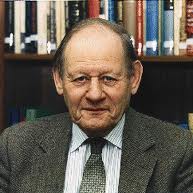
Humanism, as a philosophy of putting emphasis on human knowledge and reason, and valuing human beings, as opposed to gods, is many centuries old and has done a tremendous service to humanity as a whole. Many great figures of the age of Enlightenment identified themselves as Humanists.
More recently, however, in the age of New Atheism, humanism has somehow becomes associated with accomodationism: the view that the New Atheists are radical, shrill (or whatever you may want to call them pejoratively), that their methods alienate too many people, and that the promotion of humanist values require involvement of the religious and non-religious people alike.
The person promoting this view is none other than Paul Kurtz, the founder of the Center for Inquiry. Kurtz has been an important voice for secular and reason-based views for decades, and his past services are undeniable. More recently, however, more recently, he has become a critic of the New Atheist movement. In his Neo-Humanist statement, for example, he say the Neo-Humanists “aspire to be more inclusive by appealing to both non-religious and religious humanists and to religious believers who share common goals” and “are best defined by what they are for, not what they are against”.
There are a number of things that are wrong with these concepts. For one thing, while followers of moderate religion may have similar goals to Humanists, in practice, through their playing up the religious language and emphasizing the importance of faith, they constantly play into the hands of the fundamentalists, and by doing so they become part of the problem. Working together for common goals is fine, but aspiring to be more inclusive is not, if it means having to drop blaming religion (including moderate religion) for the harm it does. Further, very often, what you are against is just as important as what you are for. For example, it is impossible to work for social justice without clarifying your position on racism and homophobia. Paradoxically, Kurtz himself is pretty clear what the statement is meant to be against:
Writing in the December 2009/January 2010 issue of Free Inquiry, the magazine he founded, Kurtz declared “militant atheism is often truncated and narrow-minded…it is not concerned with the humanist values that ought to accompany the rejection of theism. The New Atheists, in my view, have made an important contribution to the contemporary cultural scene because they have opened religious claims to public examination…What I object to are the militant atheists who are narrow-minded about religious persons and will have nothing to do with agnostics, skeptics, or those who are indifferent to religion, dismissing them as cowardly.”
Those damn “militant atheists”!
(As much as it is a straw man attack, he seems to be trying to keep the loosely defined “New Atheism” (upper case) and militant atheism (lower case) separate.)
Kurtz’s accomodationism has not endeared him to the secularist community recently. And with secularism moving ahead a lot faster than when Kurtz had a more prominent role in it, it may be all for the better. The New Atheists have brought secular (and, yes, humanist) concerns to the public attention in a way Kurtz never could.
As an aside, the accomodationist philosopher Michael Ruse wrote an article recently, in which he decried (taking a swipe at Richard Dawkins, of course):
Humanism in its most virulent form tries to make science into a religion.
So Dawkins is either not humanist enough, or too much of a humanist? Lol. Can accomodationist faith-loving nonbelievers please get their line straight?
Which is why I am not identifying myself as a humanist. I do not want to be associated with old school humanists like Mr. Kurtz.

